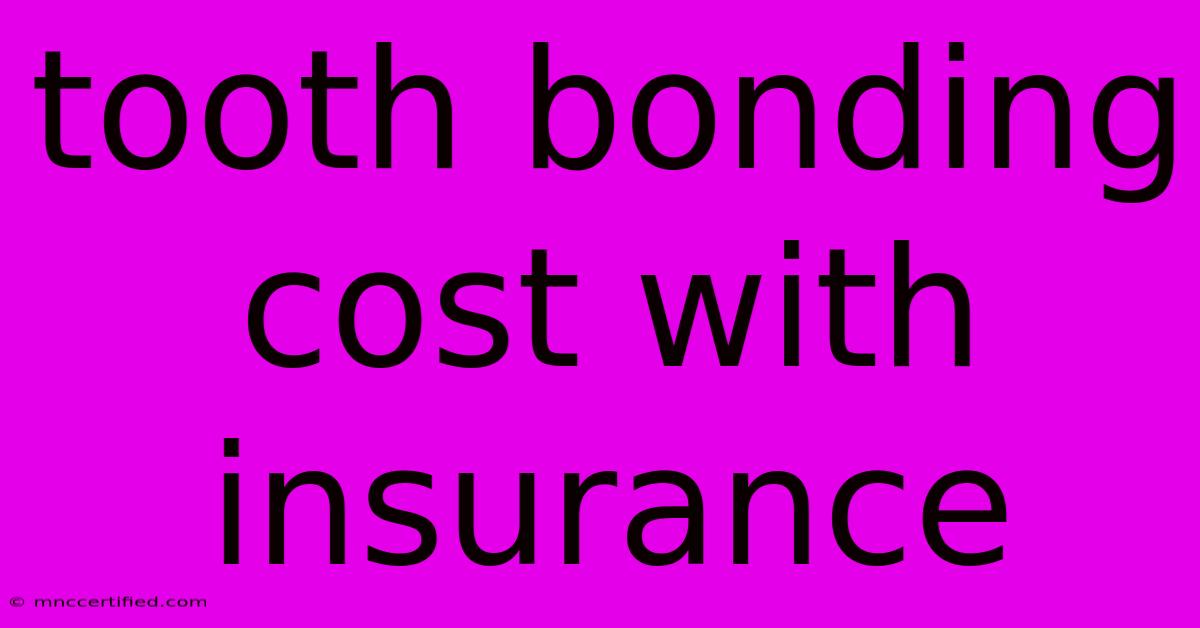Tooth Bonding Cost With Insurance

Table of Contents
Tooth Bonding Cost with Insurance: A Comprehensive Guide
Tooth bonding is a popular cosmetic dentistry procedure that can repair chipped, cracked, or discolored teeth. But how much does it cost, and will your insurance cover it? Understanding the factors that influence the price and how dental insurance plays a role is crucial before you schedule your appointment. This comprehensive guide will break down the cost of tooth bonding with insurance, helping you navigate the process with confidence.
What is Tooth Bonding?
Before diving into the cost, let's briefly define tooth bonding. It's a relatively quick and straightforward procedure where a tooth-colored resin is applied to the tooth's surface and then hardened using a special light. This resin can be molded and shaped to repair imperfections, improve the tooth's appearance, or even close gaps between teeth.
Factors Affecting Tooth Bonding Cost
Several factors significantly impact the final cost of tooth bonding:
1. Number of Teeth Bonded:
The most obvious factor is the number of teeth requiring bonding. Bonding a single tooth will naturally cost less than bonding multiple teeth.
2. Complexity of the Repair:
Simple repairs, like fixing a small chip, will generally be cheaper than more complex procedures, such as reshaping a severely damaged tooth or closing a significant gap.
3. Dentist's Location and Experience:
Costs can vary significantly depending on the dentist's location (urban areas often have higher costs) and their experience and reputation. A specialist in cosmetic dentistry may charge more than a general dentist.
4. Material Used:
The type of resin used can also affect the price. Higher-quality resins may offer better durability and color matching, but they will typically be more expensive.
Tooth Bonding Cost Without Insurance
Without insurance, the cost of tooth bonding can range from $300 to $1,000 per tooth. This wide range reflects the variations discussed above. It's crucial to get a detailed estimate from your dentist before proceeding.
Tooth Bonding Cost With Insurance: What to Expect
Whether your insurance covers tooth bonding and the extent of coverage depend heavily on your specific dental plan. Many plans consider tooth bonding a cosmetic procedure, meaning they might not offer comprehensive coverage.
Understanding Your Dental Plan:
- Check your policy details: Carefully review your policy documents to understand your coverage for cosmetic procedures. Look for terms like "orthodontics," "cosmetic dentistry," or "restorative dentistry." Some plans might cover bonding if it's considered necessary for restorative purposes, such as repairing a fractured tooth.
- Contact your insurance provider: Calling your insurance provider directly is the best way to determine your specific coverage for tooth bonding. They can provide a pre-determination of benefits, which will give you an estimate of the amount your insurance will cover.
- In-network dentists: Using a dentist within your insurance network usually results in lower out-of-pocket expenses.
Expected Coverage:
Even if your plan covers some portion of the cost, you'll likely have a significant out-of-pocket expense. Expect to pay a percentage of the cost (copay) and potentially a deductible before the insurance kicks in. Some plans may not cover tooth bonding at all.
Tips for Minimizing Costs
- Shop around: Get quotes from several dentists before committing to treatment.
- Ask about payment plans: Many dental practices offer payment plans or financing options to make treatment more affordable.
- Consider alternatives: If the cost of bonding is prohibitive, explore alternative options, such as veneers or dental crowns, although these are usually more expensive.
Conclusion: Planning Your Tooth Bonding Treatment
Understanding the cost of tooth bonding, including insurance coverage, is vital for responsible financial planning. By carefully reviewing your insurance policy, obtaining multiple quotes, and exploring payment options, you can make an informed decision and achieve the beautiful smile you desire without breaking the bank. Remember to always communicate openly with your dentist and insurance provider to ensure a smooth and transparent process.

Thank you for visiting our website wich cover about Tooth Bonding Cost With Insurance. We hope the information provided has been useful to you. Feel free to contact us if you have any questions or need further assistance. See you next time and dont miss to bookmark.
Featured Posts
-
Pitt Vs Clemson Announced Starting Lineup
Nov 17, 2024
-
Snow In Wales Met Offices Date Forecast
Nov 17, 2024
-
Trc Capital Investment Corporation
Nov 17, 2024
-
Three Lessons From Texas Arkansas Game
Nov 17, 2024
-
Monthly Aircraft Renters Insurance
Nov 17, 2024